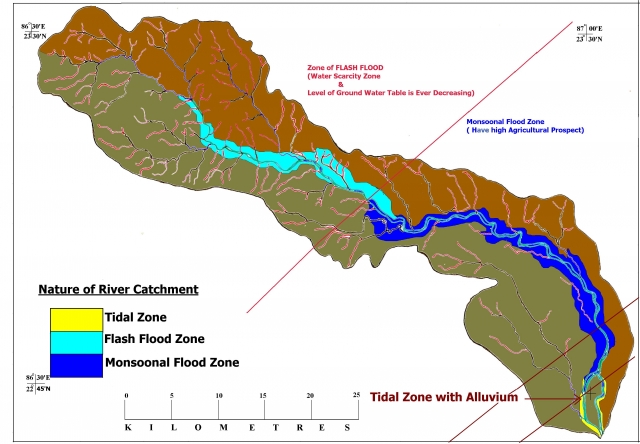/topics/ecology-and-environment
Ecology and Environment
Wagatech Pvt. Ltd. is looking for Technical cum Sales & Marketing executives
Posted on 27 Apr, 2011 01:58 PMWagatech offers creative solutions for Water and Gas industry. With its innovative leakage detection systems it facilitates conservation of vital resources like Water and Gas. Wagatech with its strategic partnership with vonRoll hydro, Switzerland shall bring in its global expertise and rich experience of managing most diverse utility networks on the planet to Indian subcontinent. Wagatech focuses on assisting municipal bodies, utility service providers as well as water distributing companies to plan, design and implement modern technologies and infrastructure, reduce transit losses in their distribution infrastructure and avoid possible damage to the public and private property due to leakages.
Dwarekeshwar river basin of West Bengal : A unique combination of flash flood zone, monsoonal flood zone & tidal zone
Posted on 27 Apr, 2011 12:59 PM In India, at national level when all the planners are saying about the water grid, river linking project, i
In India, at national level when all the planners are saying about the water grid, river linking project, i
Role of indigenous knowledge system in conservation of forest resources – A case study of the Aka tribes of Arunachal Pradesh – A paper in the Indian Journal of Traditional Knowledge
Posted on 23 Apr, 2011 09:01 PM Indigenous knowledge is the basis for local level decision making in agriculture, healthcare, food preparation, education, natural resource management, and a host of other activities in rural communities.
Indigenous knowledge is the basis for local level decision making in agriculture, healthcare, food preparation, education, natural resource management, and a host of other activities in rural communities.
National Green Tribunal (NGT) – Relevant notifications from the Ministry of Environment and Forests
Posted on 22 Apr, 2011 05:16 PMInviting endorsements on a submission to the WGEEP for declaring the rivers in the Western Ghats as Ecologically Sensitive Areas (ESAs)
Posted on 22 Apr, 2011 12:58 PMDear friends,
We are all aware of the immense ecological, cultural and social significance of rivers originating and flowing through the Western Ghats. This includes source regions of East flowing rivers like Krishna, Godavari and Cauvery and the source, riparian and estuarine region of all West flowing rivers.
We are lucky to still have some of the very few and very rare 'free flowing rivers' in the country. Most of the rivers in our country have been dammed and diverted. This has changed the ecological and physical characteristics of these rivers completely. Today, it is difficult for us to visualise the amazing range of ecological goods and services that an undammed, free flowing river can provide. Some such rivers in the Western Ghats are Shastri, Aghanashini, Gargai and Seetha Nadi.
Groundwater: From mystery to management - An article by TN Narasimhan
Posted on 22 Apr, 2011 12:07 PMGroundwater has been used for domestic and irrigation needs from time immemorial. It is a component of the hydrological cycle, vital for human sustenance. Unlike surface water, groundwater cannot be readily observed. Consequently, it was long considered to be mysterious or even occult in nature, influencing legal decisions relating to groundwater ownership and use.
Adapting to the global groundwater crisis - Its usage needs to be regulated and monitored
Posted on 22 Apr, 2011 12:03 PMThe global groundwater crisis centers on withdrawals notably exceeding short term renewable storage. The current global groundwater crisis reflects the fact that over the past century, groundwater withdrawal has grown to exceed natural renewable groundwater storage. The single most important cause is the deep well turbine pump. Groundwater depletion is very high in both the United States and India.
Chemonics is looking for specialists in forestry, climate adaptation and carbon finance in India - Apply by 31st May 2011
Posted on 22 Apr, 2011 11:17 AM Chemonics is an international development consulting company that helps governments, businesses, civil society groups, and communities promote meaningful change so people can live healthier, more productive, and more independent lives.
Chemonics is an international development consulting company that helps governments, businesses, civil society groups, and communities promote meaningful change so people can live healthier, more productive, and more independent lives.
Chemonics seeks speclialists for an anticipated USAID-funded project focused on sustainable forests and climate change mitigation in India. We are looking for individuals who have a passion for making a difference in the lives of people around the world.
A. Forestry specialist:
The forestry specialist will support reducing emissions from deforestation and forest degradation as well as enhanced sequestration, through afforestation, conservation, and sustainable management.
Energy from Water
Posted on 21 Apr, 2011 10:49 AM
An example technology is pico-hydro that uses local streams as a resource.
- The technology is transferred as an asset to households of farmers with access to streams, in the Western Ghats region.
- Most critically, the households decide the allocation of water between electricity generation and irrigation - they manage their demand for electricity based on water availability. The entire system retrofits into their current irrigation infrastructure.
- At the same time, there is an entire value chain of enterprises that develop the technology and deliver it to the farmer's doorstep, integrating access to MNRE subsidies and loans as necessary.
Traditional fishing techniques of tribes in Bastar region of Chhattisgarh – A paper in the Indian Journal of Traditional Knowledge
Posted on 20 Apr, 2011 07:52 AMTribal habitat and rich primitive culture covers many traditions and fish is an integral part of the tribal food habit since times immemorial in this region. The life of tribes mainly depends on naturally available foods which can rarely be reaped in other places. The fishing techniques are specialized according to structure, size of stream, season and species of fishes intended to be harvested.





